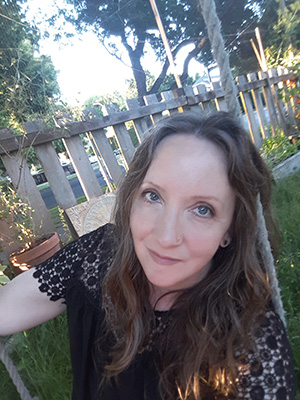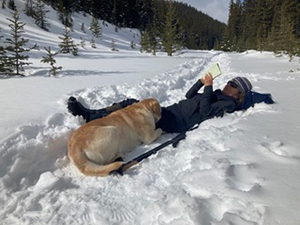The Truths We Hide: Elizabeth Adilman interviews Kyeren Regehr

Volunteer Elizabeth Adilman talks with Kyeren Regehr, whose poem “Lessons from Bewitched” appears in our summer issue #227. They discuss the line break as a magical device, taking time between the experience and the writing, and the incongruities between our words and our hearts.
Kyeren Regehr’s collection Cult Life was a finalist for the 2021 ReLit Awards and The Victoria Butler Book Prize; Disassembling A Dancer won the inaugural Raven Chapbooks contest. Her poetry has appeared in publications in Canada, Australia, and the USA, including The Literary Review of Canada, Canadian Literature, Best New Poets, Best Canadian Poetry in English, and was thrice longlisted for the CBC Poetry Awards. She holds an MFA in Writing and served on the poetry board of The Malahat Review. Kyeren’s background is in professional dance and theatre, and she once found herself in Victoria’s Poetry Slam finals by accident. She is the Artistic Director of Planet Earth Poetry, and lives with reverence on the unceded lands of the W̱SÁNEĆ people.
I had the recent pleasure of spending time with your book, Cult Life and chapbook, Disassembling A Dancer. The poem we are discussing today, “Lessons from Bewitched” seems to be a potential cross-genre creative nonfiction or autofictional poem. Is “Lessons from Bewitched” part of a larger collection you are working on?
Thank you, Elizabeth—I’m always gratefully amazed when a fellow writer is in possession of one of my books. I like the term you’re using—autofictional. “Cross-genre autofictional poetry” might be the perfect way to describe those books—I usually choose emotional veracity over literal truth, so “fictional” belongs in the mix. “Lessons from Bewitched” is part of a larger collection of a similar nature, one that’s almost complete; however, there’s a surprising amount of literal truth in this poem.
A spell or incantation is believed to draw power from spiritual agencies to accomplish magic. Many of your poems employ a kind of magic charmed by your craft choices, in particular the way you enjamb lines. For example, in the fourth stanza of “Lessons from Bewitched,” the line reads: “words penned in blue sound.” Can you talk about your process in terms of this ability you have to give objects, concepts, and organisms particular properties they didn’t have before?
Line break is a magical device, right? The delight of breaking a sentence into individual units of meaning belongs solely to poetry and brings me much joy. (I owe any line break ability I have to Lorna Crozier, who is a master.) And I’m so pleased you saw that individual line. The collection I’m presently brewing contains small spells like this, or precursors to what follows. “Blue sound” is the ink beginning to lift off the page (before the more obvious metaphor at the end); it speaks to the spell of language, the spells we cast upon ourselves with our words, but (obviously) it might also mean the sound of sadness, or the inner state of the person who penned the words. Interestingly, the words in my mother’s diary were written in blue. Had it been black ink, I would have changed it to blue, because black would have felt too heavy. It would have felt like a curse. (My mother gave me her diaries before she passed, and she gave me carte blanche, bless her.)
When you ask about giving new properties to objects, etc., I’m suddenly reminded of improvisation, and so you’ve got me thinking back to theatre days. In improvisation, you get to endow objects—often invisible, mimed objects—with any property you can think of. An actor might be miming flipping pancakes, but when she hands the flipper to the next actor, it suddenly becomes a conductor’s baton, and then it separates into knitting needles, knitting needles become ski poles, and so forth.... I spent formative years learning to make lateral leaps in classes and on stage (most often clumsily). But you don’t often think about how to re-envision a thing—it just comes to you. All art forms are somewhat transferrable.
If a poem is a vessel where voices are heard in the way a bookstore might hold poetry readings, what is the conversation you are curating in “Lessons from Bewitched”?
My goodness, you have the best questions, Elizabeth. Hmmm…on the surface I’m talking about the way we perceive events and experiences as children, and how utterly different they are in adult recollection, and how we forget our child mind.
I began this poem in 2006 in a first-year poetry class with Carla Funk (Victoria’s first Poet Laurate)—it was the first memory poem I’d ever written. I struggled for a long time with getting the memory down—I wanted to tell it from a child’s perspective, because I didn’t want any echoes of victimization or blame (we’re all just doing our best, and being an adult in this world is so hard), but the poem kept slipping into the voice of a retrospective speaker. Years later, I wove in snippets from that old television series in an attempt to offset the adult voice—it also happens to be factually true that my sister and I were watching Bewitched when our parents sprung this news on us. My sister was three, and so she’s the tiny girl counting her mother’s teeth during a lecture. My husband mentioned that scene in the show, and soon after he said it, I lifted the poem’s lid and stirred it in. After my mother passed, the final stanza arrived. It’s taken eighteen years to write this poem (and it could change again before the collection goes out).
As it refined, it also became about the stories we tell ourselves and the stories we tell others. How often do our words align with our internal experience? That night, my mother said something which in hindsight I hadn’t believed. It could have been an agreed upon phrase, or words said to make the divorce easier—a Band-Aid slapped across what was really being felt. She said, “we don’t love each other anymore”. That didn’t make it into the final draft, but the diary entry, which is it’s opposite, did. I think the poem might offer a small space to consider the truths we hide, the things we don’t allow ourselves to speak aloud, the spells we cast upon ourselves with our words, both publicly and privately—the incongruities between our words and our hearts. But maybe that’s not detectible in the poem at all, perhaps that’s only available via this interview?
When I read your work, I feel like you are whispering (just) to me secret details that reveal situations that ultimately tell your story. Your nuance is remarkable, almost instructional. Can you say more about how you collect your observations—about your process of integration as a writer?
Your questions are remarkable (and I’m heartened to hear that the poems speak to you). I attribute any collection of details to the underrated genius of the human subconscious—everything is there, readily accessible, when we get still and listen. And when we write, so much opens up and pours out, doesn’t it? Sometimes it’s a Pandora’s box. Selecting which details to use is another thing. I’m grateful for Eliot and his Unity of Effect—Eliot’s essays came very early in my writing apprenticeship, and U of E shaped the way I work. In poetry, every word holds so much weight—in any crafted writing, really, but especially so in poetry—and like most poets, I wrestle with the personally precious versus those observations that truly unify. It’s often hard to be ruthless. But as I already admitted, I tend to change any details that obstruct emotional veracity.
What is one piece of advice that has had a profound effect on the way you write?
Perhaps my mind is bent on Eliot now, but this phrase arises so often when I mentor writers, so it’s readily accessible: “The more perfect the artist the more completely separate in him will be the man who suffers and the mind which creates; the more perfectly will the mind digest and transmute the passions which are its material.” This has been a guiding light for me (yes, even with its man-focused diction), because so much of what I’ve written is autobiographical (or autofictional!) When I’m too close to an event/experience, the work can get murky. It can be a bit of a catch 22, can’t it? So often the emotion that feeds our work keeps us from seeing what needs to be burnt away.
And I guess this hearkens back to the end of your last question, in that Eliot’s quote speaks to the integration of the writer’s experience. When I consider the distance between my time in the ashram and writing Cult Life (about a decade), and then the editorial process that lasted another five years, the material was well integrated. I sunk into a depression after I left—it’s so hard to leave community and deep friendships. But a few of my friends are now composite characters, and that necessity would have been impossible closer to the experience. The collection I’m writing now also draws from the past—from childhood to maybe ten years ago—so this time-gap must be a thing for me. I hadn’t thought about it. Thank you, Elizabeth.
Which artists—poets, dancers, musicians, painters, or others—have most influenced you as a writer?
I find this sort of question so hard—having been birthed from an MFA program, there are several very important writers who shaped me, indelibly so. Without them, my writing would be flaccid and uncrafted—I owe them so much—and yet I’ve spent over a decade trying to escape their editorial voices in my ears and write the way I want to write. And I’ve already mentioned Lorna and Carla in this interview. When I think about influential poets, so many of them were offered by my teachers—Dionne Brand was given by Steven Price, Syliva Legris’ work came to me via Tim Lilburn (I could lose myself in the worlds of those women for lifetimes—their voices are like no one else’s).
Here’s an influence utterly unrelated to my teachers—I’ve been on a Kazim Ali binge for quite some time, and his work has changed the way I’m presently writing. Kazim does whatever he wants. He’s fearless. I guess I’m searching for my own fearlessness. I recently rewrote several poems using one of his structural techniques in an attempt to break out of old patterns, and then in subsequent rewrites found an astonishing new freedom. I began with his first collection, but he has a selected now: Sukun (Gooselane Editions), I highly recommend finding it.

Elizabeth Adilman









